| Srl | Item |
| 1 |
ID:
112436


|
|
|
|
|
| Publication |
2012.
|
| Summary/Abstract |
This paper identifies imaginings since the early 1990s to reposition Yunnan from a peripheral province in the PRC to the centre of various regional constructs which involve territories across the PRC's borders, primarily in what are now known as southeast and south Asia. These narratives, which change over time and between actors, are justified using Yunnan's past linkages with territories along the 'southern silk road' and through a naturalized presentation of its geographical location and characteristics, are based on the premise of good neighbourly relations, and are driven by imperatives of development. They find practical expression in provincial engagement with regional institutions, and in infrastructure and other programmes. However, the imaginings to reposition the province which these narratives spell out are at the same time constrained by the demands of territorial integrity and national security: a desire not to compromise Yunnan's national belonging. The paper concludes by commenting on implications for understanding 'China's borderlands' and their global interactions.
|
|
|
|
|
|
|
|
|
|
|
|
|
|
|
|
| 2 |
ID:
138470
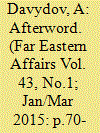

|
|
|
|
|
| Summary/Abstract |
The subject of the round table is quite timely. It is all the more important inasmuch as the assessment of the situation in East Asia given in reports and statements of experts and mass media representatives of various countries, not only foreign, but also Russian, are often based not so much on an analysis of actions of these countries, as on certain initiatives and expressions of their politicians, which sometimes have a too emotional, if not propaganda or provocative, character.
|
|
|
|
|
|
|
|
|
|
|
|
|
|
|
|
| 3 |
ID:
113079
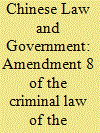

|
|
|
| 4 |
ID:
111304
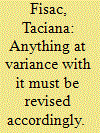

|
|
|
| 5 |
ID:
114224
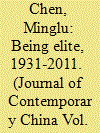

|
|
|
|
|
| Publication |
2012.
|
| Summary/Abstract |
Current interpretations of the People's Republic of China emphasize the discontinuities of 1949, and even 1978 to some extent. An examination of the experience of a Chinese family from 1931 to 2011 through three generations suggests that processes of elite formation are more complex and their interpretation might be more nuanced. In the process it highlights how one elite family managed to establish and maintain its elite status against a background of dramatic social change, and raises questions of the relationship between elite formation and the existence of a ruling class.
|
|
|
|
|
|
|
|
|
|
|
|
|
|
|
|
| 6 |
ID:
151635
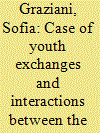

|
|
|
|
|
| Summary/Abstract |
Soon after the founding of the People's Republic of China (PRC), youth exchanges came to be a major part of the Chinese campaign to reach out and influence the people of other nations. Despite the growing scholarly discussion regarding the role of people-to-people diplomacy and external propaganda in China's foreign policy, so far no direct attention has been paid to the Chinese Communist Party's efforts to institutionalize youth exchanges and use them as a tool to promote the new Chinese government's foreign relations. This article locates the position of young people within the PRC's people-to-people diplomacy. It attempts to explore youth exchanges with the West in the early years of the Cold War by focusing on relations between Italian and Chinese youth groups in the 1950s. Relying mainly on unexplored archival material and memoirs, this article documents contacts and exchanges between adult-led youth organizations and their members, and shows how Italian left-wing party-affiliated youth groups and Soviet-dominated transnational organizations provided important channels for Sino-Italian encounters and for building long-lasting contacts among potential future leaders of these countries.
|
|
|
|
|
|
|
|
|
|
|
|
|
|
|
|
| 7 |
ID:
101133
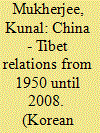

|
|
|
| 8 |
ID:
148338
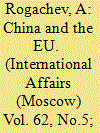

|
|
|
|
|
| Summary/Abstract |
AS OF LATE, the recognition of China as a market economy has unexpectedly become an acute political issue for the European Union, emerging as a subject of controversial and heated debate both within European institutions and in the international arena as a whole.
|
|
|
|
|
|
|
|
|
|
|
|
|
|
|
|
| 9 |
ID:
138029
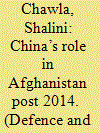

|
|
|
|
|
| Summary/Abstract |
China and Afghanistan are traditional friendly neighbours. China pays great attention to developments in Afghanistan and is committed to deepening both countries' strategic partnership, and so decided to appoint a special envoy.
|
|
|
|
|
|
|
|
|
|
|
|
|
|
|
|
| 10 |
ID:
119141
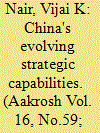

|
|
|
| 11 |
ID:
115347
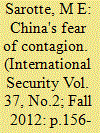

|
|
|
|
|
| Publication |
2012.
|
| Summary/Abstract |
The Tiananmen Square massacre of June 1989 remains a taboo topic in the People's Republic of China (PRC); the ruling Chinese Communist Party (CCP) still detains participants and suppresses online, popular, and scholarly discussions of it. The twentieth anniversary of the end of the transatlantic Cold War, however, saw the release of new sources from high-level contacts between the CCP and foreign leaders. These new sources, combined with older ones, show the extent to which Chinese political leaders were obsessed with the democratic changes in Eastern Europe and were willing to take violent action to prevent similar events on their territory. This obsession has received mention from a few scholars, but until now it has played too small a role in the current understanding of Tiananmen. New evidence documents that one of the main motivations for the CCP in deploying the army in June 1989-on the same day as semi-free elections in Poland-was its desire to combat possible contagion from the events in Europe. These sources also show that the CCP knew it had little to fear from reprisals by the United States, which it predicted would take "no real countermeasures."
|
|
|
|
|
|
|
|
|
|
|
|
|
|
|
|
| 12 |
ID:
141373
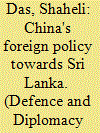

|
|
|
| 13 |
ID:
105659
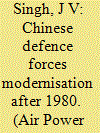

|
|
|
| 14 |
ID:
183451
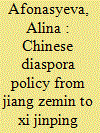

|
|
|
|
|
| Summary/Abstract |
This article studies PRC policy toward the Chinese diaspora during the periods of Jiang Zemin, Hu Jintao, and Xi Jinping (from 1993 to the present). This period saw the evolution of mechanisms created earlier for working abroad with Chinese expatriates (huaqiao-huareri), domestically with huaqiao-huaren who have returned to China, relatives of émigrés, and émigrés who have returned to China (guiqiao-qiaojuan) in a flexible system capable of adapting to the Chinese and international reality and effectively drawing the resources of the diaspora to implementing grand PRC projects and initiatives.
|
|
|
|
|
|
|
|
|
|
|
|
|
|
|
|
| 15 |
ID:
183452


|
|
|
|
|
| Summary/Abstract |
This article studies PRC policy toward the Chinese diaspora during the periods of Jiang Zemin, Hu Jintao, and Xi Jinping (from 1993 to the present). This period saw the evolution of mechanisms created earlier for working abroad with Chinese expatriates (huaqiao-huaren), domestically with huaqiao-huaren who have returned to China, relatives of émigrés, and émigrés who have returned to China (guiqiao-qiaojuan) in a flexible system capable of adapting to Chinese and international reality and effectively drawing the resources of the diaspora to implementing grand PRC projects and initiatives.
|
|
|
|
|
|
|
|
|
|
|
|
|
|
|
|
| 16 |
ID:
146024
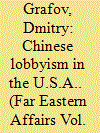

|
|
|
|
|
| Summary/Abstract |
The author analyzes the lobbyism of U.S. interests in China and the counterlobbyism of Chinese interests in the U.S. in its executive and legislative bodies. Special attention is paid to the reciprocal coordination of these interests and mechanisms with whose help the Chinese authorities are trying to influence the adoption of political decisions in the U.S. Congress and presidential administration. Concrete examples of the interaction between American and Chinese lobbyists are cited.
|
|
|
|
|
|
|
|
|
|
|
|
|
|
|
|
| 17 |
ID:
142946
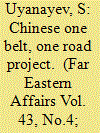

|
|
|
|
|
| Summary/Abstract |
This article examines the geographical boundaries, fundamental goals, principles, and ways of implementing the Chinese initative of the silk road economic belt.
|
|
|
|
|
|
|
|
|
|
|
|
|
|
|
|
| 18 |
ID:
169551


|
|
|
|
|
| Summary/Abstract |
This paper analyzes the changes occurring in China's macroeconomic planning under the 12th and 13th five-year plans of socioeconomic development (2011-2020). It examines the trends that took shape while the 12th five-year plan (2011-2015) was being prepared and carried out, and eventually projected into the 13th five-year plan (2016-2020).
|
|
|
|
|
|
|
|
|
|
|
|
|
|
|
|
| 19 |
ID:
137779
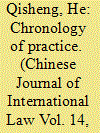

|
|
|
|
|
| Summary/Abstract |
This survey covers materials reflecting the practice of private international law in China in 2013. The survey covers laws, administrative regulations and judicial interpretations that were revised or took effect in 2013. The important specific legal instruments that were affected in 2013 include: the Civil Procedure Law; Trademark Law; Company Law; Regulations of the PRC on the Administration of Foreign-Funded Insurance Companies; Regulations of the PRC on Administration of the Entry and Exit of Foreigners; Reply of the SPC on Whether Maritime Courts May Apply the Small Claims Procedure; Provisions of the SPC on Handling Judicial Assistance Requests for the Service of Judicial Documents, Taking of Evidence in Civil or Commercial Matters in Accordance with International Conventions and Bilateral Treaties on Judicial Assistance; Implementation Rules on “The Provisions of the SPC on Handling Judicial Assistance Requests for the Service of Judicial Documents, Taking of Evidence in Civil or Commercial Matters in Accordance with International Conventions and Bilateral Treaties on Judicial Assistance” (for Trial Implementation); Interpretation (I) of the SPC on Certain Issues Concerning the Application of the “Law of the PRC on Application of Law to Foreign-Related Civil Relations”. This survey also covers cases decided in 2013 in the following areas: proof of foreign law; jurisdiction (exclusive jurisdiction; choice of court agreements; distrainable property, maritime jurisdiction); choice of law (conflicts in current Chinese laws and their solutions, sale contracts, loan and guaranty contracts, equity transfer contracts, export credit insurance contracts, arbitration agreements, employment, maritime matters and intellectual property); foreign judgments; arbitration and foreign awards.
|
|
|
|
|
|
|
|
|
|
|
|
|
|
|
|
| 20 |
ID:
114223
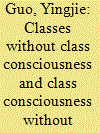

|
|
|
|
|
| Publication |
2012.
|
| Summary/Abstract |
The meaning of class, like many other things, is conferred by historically specific chains of signification or discourses that constitute the identity and significance of class as a social reality. Therefore, much of the conceptual purchase and explanatory power of class will be lost when the concept is taken out of the theories in which it is embedded. This is exactly the case with the use of class in the People's Republic of China in the last two or three decades, when the Marxist approach to class has been rejected and 'forgotten' by the social analysts and the Chinese Communist Party-even though the latter continues to pay lip service to Marxism-in favour of alternative concepts, methodologies and theories that sidestep class relations. The point of departure here is not so much sociological as political-ideological.
|
|
|
|
|
|
|
|
|
|
|
|
|
|
|
|